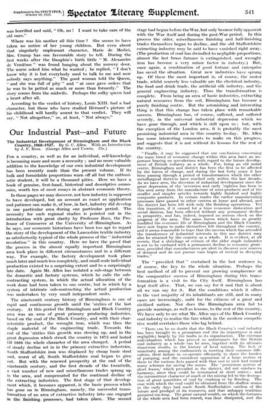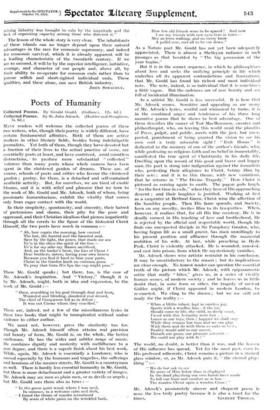Our Industrial Past—and Future
The Industrial Development of Birmingham and the Black Country, 1860-1927. By G. C. Allen. With an Introduction by J. F. Rees. (George Allen and Unwin. 25s.)
Fon a country, as well as for an individual, self-knowledge is becoming more and more a necessity ; and no more valuable addition to the knowledge of our own industrial development has been recently made than the present volume. If its bulk and formidable proportions warn off all but the enthusi- astic student, it will be a thousand pities. Here we have a book of genuine, first-hand, historical and descriptive econo- mics, worth ten of most essays in abstract economic theory.
In these pages we may discover, not how industry is supposed to have developed, but an account as exact as application and patience can make it, of how, in fact, industry did develop in one particular area during one particular period. The necessity for such regional studies is pointed out in the introduction with great clarity by Professor Rees, the Pro- fessor of Commerce at the University of •Birmingham. As he says, our economic historians have been too apt to regard the story of the development of the Lancashire textile industry as satisfactorily typical of the whole process of the " industrial revolution " in this country. Here we have the proof that the process in the almost equally important Birmingham area took place in different circumstances and in a different way. For example, the factory development took place much later and much less completely, and small scale individual production existed to a surprising extent and to a surprisingly late date. Again Mr. Allen has isolated a sub-stage between the domestic and factory systems, which he calls the sub- contracting system, in which the actual allocation of the work done had been taken to one centre, but in which by a system of intricate " sub-contracting the actual production was undertaken by very small independent units.
The nineteenth century history of Birmingham is one of rapid and continuous growth until the 'sixties of the last century. At this period the Birmingham and Black Country area was an area of great primary producing industries, based on the coal of the Black Country, and with their char- acteristic product, the wrought iron, which was then the staple material of the engineering trade. Towards the end of the 'sixties this growth was slowing up, and in the great depression which struck the country in 1875 and lasted till 1886 the whole character of the area changed. A period of steady decline set in in the primary extractive industries. South Staffordshire iron was displaced by cheap basic steel and, worst of all, South Staffordshire coal began to give out. But with the renewed prosperity at the end of the nineteenth century, and the first decade of the twentieth, a vast number of new and miscellaneous trades sprang up in the area, and compensated for the continual decline of the extracting industries. The first stage of that develop- ment which, it becomes apparent, is the basic process which has gone on in Birmingham, namely, the successful trans- formation of an area of extractive industry into one engaged in the finishing_ processes,- -had taken -place. The- second stage had begun before the War, but only became fully apparent with the War itself and during the post-War period. In this process the older, miscellaneous finishing and half-finishing trades themselves began to decline, and the old Staffordshire extracting industry may be said to have vanished right away. (The produCtion of coal has dwindled to negligible proportions, almost the last brass furnace is extinguished, and wrought iron has become a very minor factor in industry.) But, once again, a combination of good fortune and enterprise has saved the situation. Great new industries have sprung up. Of these the most important is, of course, the motor trade, whilst scarcely less valuable are the electrical industry, the food and drink trade, the artificial silk industry, and the general engineering industry. Thus the transformation is complete. From being an area of basic industries, extracting natural resources from the soil, Birmingham has become a purely finishing centre. But the astonishing and interesting thing is that this change has taken place with remarkable success. Birmingham has, of course, suffered, and suffered severely, in the universal industrial depression which we have gone through, and which is still upon us ; but, with the exception of the London area, it is probably the most promising industrial area in this country to-day. Mr. Allen has some interesting comments to make on this progress, and suggests that it is not without its lessons for the rest of the country.
" Finally, it may be suggested that our conclusions concerning the main trend of economic change within this area have an im- portant bearing on speculations with regard to the future develcip- ment of British industry as a whole. For, being an old metal centre, Birmingham and district has been the first to be affected by the forces of change, and during the last forty years it has been passing through a period of transformation which the other metallurgical districts have reached only within the last decade. As we have seen, the direction of industrial development since the great depression of the 'seventies and early 'eighties has been in this area away from the manufacture of semi-products and of tho smaller and simpler articles towards highly finished and highly composite products. In certain trades the earlier manufacturing processes have passed to other centres at home and abroad, and the district has been left with only the finishing operations. Yet this transition, if it caused for a time economic dislocation and social distress, has been effected without any permanent decline in prosperity, and has, indeed, imposed no serious check on the progress of the area. The same forces which have so greatly modified the economic life of Birmingham and the Black Country have now begun to make themselves felt throughout the country, and it seems reasonable to hope that the success which has attended the transference of industrial interests in this one district may also be attained by the country as a whole. It is evident, at all events, that a shrinkage of certain of the older staple industries is not to be confused with a permanent decline in economic great- ness, provided that manufacturers are alert to discover now sources of demand and do not pursue vain hopes of revival in decaying trades."
The " provided that " contained in the last sentence is, of course, the key to the whole situation. Perhaps the best method of all to prevent our growing complacence at the comparative success of Birmingham during this trans- formation is a visit to the City itself. Birmingham has kept itself alive. That, we can say for it and that is about all we can say for it. But the conditions which it offers to the vast majority of its inhabitants are still, and in many cases are increasingly, unfit for the citizens of a great and civilized nation. Nor does the Birmingham area fail to provide warnings, as well as lessons, to the rest of the country. We have only to see what Mr. Allen says of the Black Country coal industry to realize the fate which in the modern competi- tive world overtakes those who lag behind.
" There can be no doubt that the Black Country's coal industry has been brought to a premature end (for its importance is now negligible) largely by the faults in its organization. The extreme individualism which has proved so unfortunate for the British coal" industry as a whole can be seen, together with its ultimate disastrous results, in the history of local mining. The lack of unanimity among the coalmasters in meeting their common diffi- culties, their failure to co-operate efficiently to share the burden of pumping, and the consistent opposition of a large section of them to the various Acts passed with that end in view had ruined many schemes for saving the mines. The pernicious system of short leases,' which proiailed in the district, did not conduce to harmony, since they could be terminated at short notice ; and the intermittent character of much of the mining led to the destruc- tion of great quantities of coal by crushing or by flooding. The ease with which the coal could be obtained from the shallow seams in the early days had made South Staffordshire careless of the future and prodigal of its resources, and that unhappy tradition persisted too long. The great natural wealth, on which the fortunes of the whole area had been reared, was thus dissipated, and the
mining was brought to ruin by The ineptitude and the lack of organizing capacity Among those who directed it."
The lesson of the whole story is very clear. The inhabitants of these islands can no longer depend upon their natural advantages in the race for economic supremacy, and indeed for economic survival, which it is already apparent will be a leading characteristic of. the twentieth century. If we are to succeed, it will.be by the superior intelligence, initiative, courage, and character of our people and, above all, by their ability to co-operate- for _common ends rather -than to pursue selfish and short-sighted individual ends. These qualities, and these alone, can save British industry.
• JOInsi STRACHEY.























































 Previous page
Previous page